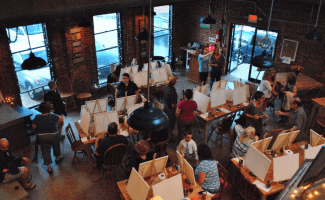For those of you who are captivated by New England history, find remnants of the Monadnock region’s industrial past preserved in buildings overtaken by the arts. You’ll find some wonderful surprises!
From lunchtime concerts to film screenings and site-specific installations, Epsilon Spires makes the most of a renovated 19th-century Victorian Gothic and Gothic Revival church in downtown Brattleboro, Vermont. Noteworthy features of this building include a double balcony, stained glass windows, antique wooden pews with stories to tell, a historic pipe organ, and a trap door to a baptismal font beneath the stage. Climb to the top of the stairs to visit artist studios and ring the old bell!
NOVA ARTS is the collaborative arts initiative of Terra Nova Coffee Roasters and Brewbakers Cafe in Keene. Coffee shop by day, the old-warehouse-turned-cafe transforms into a concert venue by night. You’ll see their grand piano hanging out on the inconspicuously elevated stage next to the tables and chairs. Established and emerging artists of all kinds set up here, from local indie bands and puppeteers to paintings on the walls and murals on the outside of the building. Off to the side, artisans hold workshops and display their crafts. Look out for the occasional pop-up artisan market and for the annual Thing in the Spring music festival in May!
A glass repair service left a dilapidated barn on Route 101 until the DublinArts & Muse Gallery transformed it into a multi-use arts and event space with a lot of personality. While most of the building was gutted, huge windows give a sense of the former factory and repair shop. Exposed rustic logs from Maine trees replaced steel support beams in dividing the first and second stories. For an artistic flair, bittersweet vine from the once abandoned property is twisted into stairway banisters leading up to the second floor. Visit to experience an eclectic mix of arts, classroom, and gallery space filled with unique and antique decor!
First opened in 1924 at the peak of the vaudeville era, the renovated 900-seat Colonial Performing Arts Center in Keene maintains much of its original Italian Renaissance-style auditorium. Enjoy a show enveloped in the architectural grandeur of dancing figures, gilded marble columns, and French doors and grills. While you’re there, stop behind the main theater to catch a film at the Showroom, a much newer multi-use black box theater repurposed from an early 20th century auto business that manufactured vehicles from 1915-1935. Preserved original wooden flooring, exposed pipes, and glimpses of large steel girders that brought cars to the second floor offer a flair of historic ambiance from Keene’s industrial past.
Perfectly at the intersection of modernity and rustic charm, the Peterborough Players’ produce and livestream professional theater in a 250-seat state of the art venue renovated multiple times from an abandoned barn. The 18th century building, located at the end of a long wooded road, was purchased during the Great Depression! Latest renovations include the outdoor Elsewhere Stage for summer performances. In the warmer months, audiences will picnic on their flowery patio and landscaped grounds.
Sometimes, when the arts take over old industrial spaces, like the giant orange hole punching machine at Mole Hill Theatre in Alstead. This 140-seat theater, fashioned out of a 20th century United Tool storage area, makes for an intimate experience of local bluegrass, folk, blues, and indie musicians and bands. Concerts are BYOB!
The Peterborough Community Theatre, having first opened in 1914, is New Hampshire’s oldest movie theater. With 95 seats and a single screen, the theater only made the jump to digital from 35mm film in 2013. The theater is deeply ingrained into the town’s history as an entertainment and performance venue and is still often used for community events in addition to movies and film screenings.
Surrounded by trails for hiking and biking, the Hancock Depot Cabaret operates in the midst of outdoor enthusiasts and adventurers. Began as the Hancock Train Station in 1878, the depot was used as tourist and summer farmer accommodations until the Hancock Depot Association started hosting open mic cabarets and renting out the venue for arts events and private functions.




